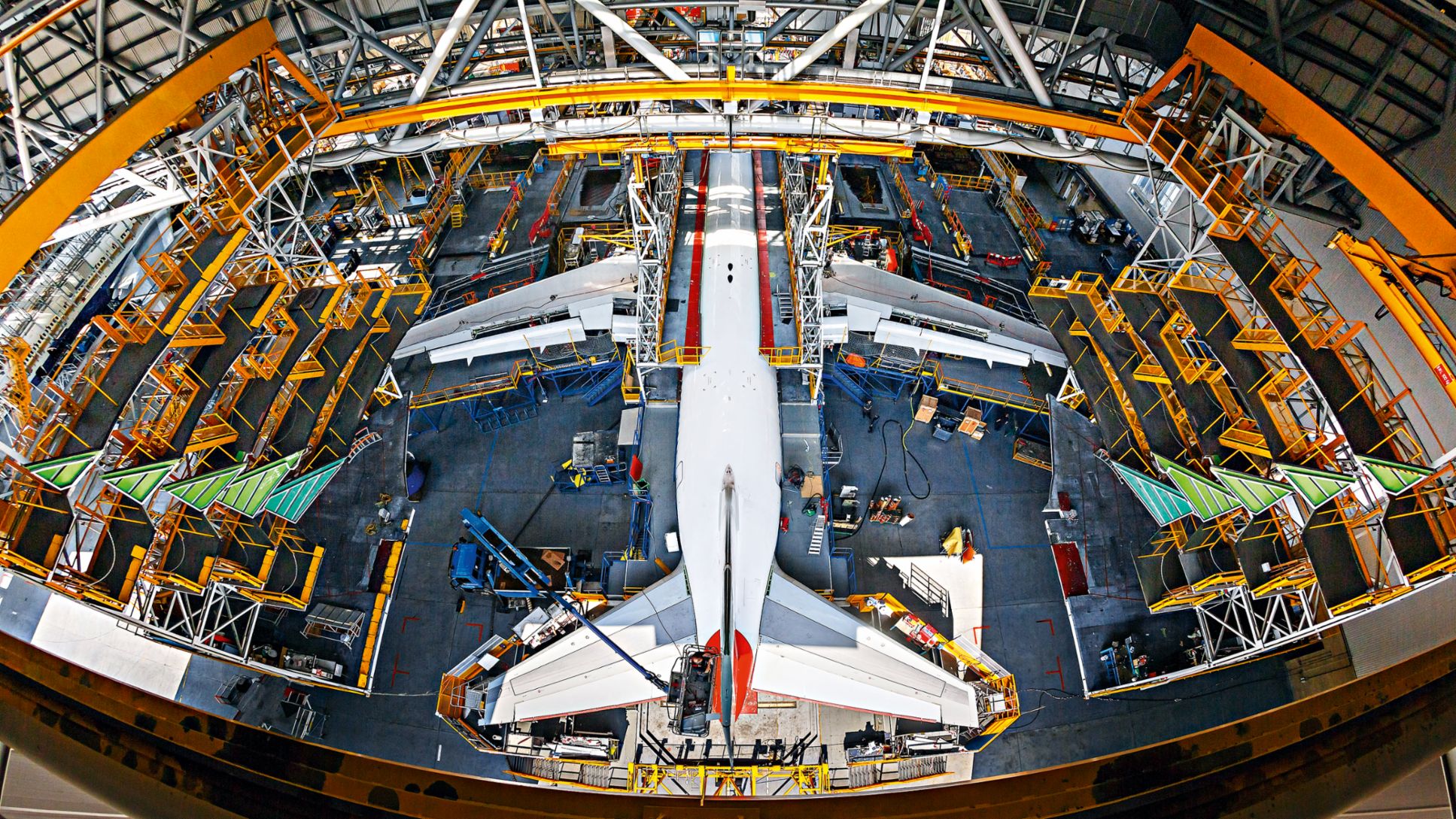The Boeing 777 with registration G-VIIR has covered a lot of ground. Over the past few weeks, this British Airways aircraft has flown back and forth between London Gatwick and Orlando, Florida, Antigua, Cancún, Punta Cana in the Dominican Republic, and Saint Kitts and Nevis. Following nearly 48,000 flight hours, the plane has come to Cardiff in idyllic Wales for maintenance. At 14 years old, it is still quite young. The routine D2 inspection will take 10,000 working hours in Bay One, the first of three such bays in the hangar. Over the course of the check, all of the plane’s components will be closely examined and overhauled.
At first glance it appears that the engineers in Bay One are working as usual. Wearing safety goggles and heavy footwear, they are immersed in their jobs. They’re opening the engine assemblies and laying bare the strings of cables in the fuselage. But not everyone standing around the plane is an aircraft engineer. Some of them are engineers from Porsche Consulting in Germany, headquartered in the town of Bietigheim Bissingen near Stuttgart. They are charged with helping to make maintenance work on British Airways’ long-haul planes more efficient.
Porsche consultants help to lower costs
British Airways is seeking to lower the costs of maintaining its aircraft. This is necessary given the rising level of competition in the aviation industry. The airline is focused on keeping heavy maintenance competitive and efficient. Porsche consultants have been called upon to assist. “The challenge in the heavy maintenance sector is always a matter of performing an entire series of tasks to meet high standards in a costeffective manner,” says Bill Kelly, who is general manager of heavy maintenance for British Airways Engineering. Cost pressures are clearly on the rise, and Kelly notes that “the market for maintenance and repair work has become very competitive.” He wants to significantly lower costs over the coming years—but without making sacrifices in safety. “That will help us maintain our competitive position over the long term. After all, planes can be taken anywhere in the world for maintenance—there aren’t any islands in this business.”
British Airways, a “legacy carrier,” has many older planes. Over the years, individual areas of these planes are overhauled such that their condition is equivalent to nearly new. The shell remains in place until the plane is finally taken out of operation, but almost all other components are successively replaced. The level of maintenance increases with the age of the plane. But that is not the only consideration for the engineers at British Airways. The new planes too—especially the Boeing 787—present challenges to the processes.
Of paramount importance is reliable planning with full transparency at all times, says Claus Lintz, Principal at Porsche Consulting. “The airline has to know precisely whether it will be able to meet its maintenance schedule and when it will get its aircraft back. If a certain aircraft is scheduled for a flight but does not return from maintenance on time, we’re talking about major sums right away. And—even more importantly—about customer satisfaction.”
Long-term improvement
Just about half of the maintenance steps can be planned, says Lintz, who has a degree in engineering. Kelly nods in agreement and adds, “Our planning has already improved and is expected to be enhanced all the more.” Hitches in the past often had to do with the availability of replacement parts. They represent a major cost in the aviation industry—an operating lever for an air-conditioning system can easily cost more than 300,000 euros, and has a delivery time of several months.
“The aim is to shorten the time spent on the ground,” says Garry Copeland, Managing Director of Operations at British Airways. This is one step in continuously raising the competitiveness of the airline and achieving long-term improvement. “We want to learn techniques and approaches and integrate them into our corporate culture,” he adds. This has already been achieved at the Glasgow site, where British Airways does maintenance on the Airbus A320 family.
Together with the Porsche consultants, the company succeeded in reducing the downtime for its short-haul fleet by 20 percent. Restructuring the material procurement processes was a big help in this regard, reports Lintz. He now wants to ensure that the aviation engineers in Cardiff also spend less time in search of components and tools. As he explains, “It has to work like it does for physicians. The instruments have to be there at the right moment and be presented as if on an operating table.”
Data helps to find possible areas of wear
That is just one example of optimization that the Porsche consultants have launched. The approach is designed not only to improve individual parts of processes but also to enhance the interfaces between different divisions at the airline. This has been a significant challenge in the past. “There is an enormous amount of data on the situations and conditions that planes have been exposed to and whether they have been through unusual circumstances like hard landings,” says Lintz.
But whereas the deployment planners have this data, the maintenance staff often do not have easy access to it. It would be helpful to know, for example, whether a plane had flown largely over desert regions or oceans, for this can provide early indications of possible areas of wear. The sooner it is clear where exactly maintenance is needed, the better the associated planning.
Tracking spare part deliveries is also a fundamental requirement. This can be critical, for example, if an urgently needed part has to be ordered from the main warehouse at the British Airways Distribution Centre in Heathrow. Information on when exactly the part will arrive at its destination in Cardiff is needed for efficient planning. “At the Porsche factories in Zuffenhausen and Leipzig, it is clear at all times where the parts are and where they’re coming from,” says Lintz. Amazon can also serve as a model here when it comes to precision tracing of a component’s multistage journey from the supplier to the destination. “That has to be the goal for heavy maintenance at British Airways, too.”
Doing things better and preventing waste
A plane the size of a Boeing 777 consists of around 100,000 individual parts. A major D check will leave no screw unexamined, and will replace approximately 10,000 parts. The engineers work with around 8,000 job cards, each of which can list several dozen steps. Each individual job card needs to be worked through before the plane is cleared to fly.
As General Manager of Heavy Maintenance, Kelly envisions having other divisions at British Airways benefit from the knowledge he has gained. This will be all the more relevant as it becomes more important to cut costs in other areas as well. No-frills airlines and a challenging world economy have made the aviation business more complicated. “That applies not only to us but also to our suppliers and to theirs in turn,” he notes. Although passenger volumes worldwide are increasing by around five percent a year, better coordination will be needed to keep costs at an acceptable level across the entire value chain. “There’s an enormous amount of potential there for everyone involved, which should be made use of,” observes Lintz.
As far as processes go, the airlines can learn from automobile manufacturers. “When you look behind the scenes, you can see that car makers are facing challenges similar to ours,” says Kelly. He values the fact that the experts from Porsche Consulting think like engineers. Copeland shares this view, noting that “it’s very helpful that we have a similar way of thinking. It’s easier for our engineers when they get suggestions from consultants who are connected to high-end products themselves. That adds to their credibility.” Copeland sees three essential points: “We’re doing things better—for our customers and for our employees—and we’re preventing waste. Porsche Consulting is helping us with all three of these points.”
For Lintz it’s important to put self-learning cultures of improvement into place in Glasgow and Cardiff. As he says, “The first step in increasing efficiency has been taken and now British Airways has to work continuously on itself.” The maintenance department is confident that the improvements will be attained and competitive viability secured. “If we put the necessary changes into practice, that helps protect British Airways’ long-term future,” says Kelly.
Info
Text first published in „Porsche Consulting - THE MAGAZINE", Issue 15
Author: Nina Trentmann




